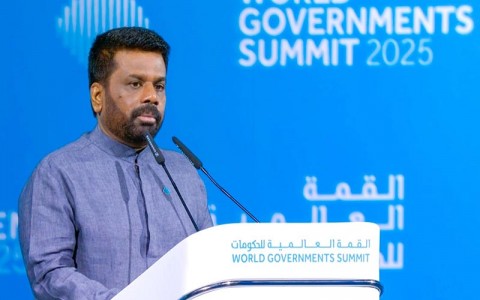
Esteemed state leaders, distinguished delegates representing various organisations, honoured guests, members of the media and all those present, I seek your permission to address this extraordinary summit.
It is a great privilege to speak at this significant gathering, held at a crucial juncture in human history, at a time when the world calls for unprecedented global cooperation.
My country is a beautiful island nation with a unique history, a present filled with optimistic dreams for the future and a citizenry that possesses broad political and social awareness. The people of my country have a deep sense of empathy for events occurring anywhere in the world. While they cherish their traditions, they also demonstrate the wisdom and openness necessary to embrace change when required.
Moreover, if you were to search the internet at this very moment with your mobile phone and ask, “Which country has the highest number of eye donations in the world?” the answer would be the nation I represent, located at the edge of the Indian subcontinent: ‘Sri Lanka’.
It is a great honour and privilege for me to represent a nation of such altruistic and warm-hearted citizens, I take immense pride in addressing you on their behalf.
I believe that this summit, which focuses on developing future strategies and policies concerning critical aspects of human progress, will contribute positively to global well-being at some point.
Today, the challenges we face at national, regional and global levels are vast and complex.
Some choose to ignore these issues, embarking on self-cantered journeys. However, isolated problems of today soon evolve into global concerns of tomorrow, knocking on everyone’s doors ultimately bringing an end to solitary pursuits.
Therefore, I reiterate the importance of uniting as global citizens to confront cross-border challenges together. Addressing these crises requires collective global action and a unified front.
Effective Governance and Accountability
Enhancing governance accountability and efficiency is essential for the future world. Citizens must be encouraged to transition from individual efforts to collective initiatives.
The structure of state institutions and bureaucratic systems must prioritize accountability and responsibility, as these are crucial for the future of governance.
Social justice and the rule of law are not only vital for a regulated state but also for a well-functioning professional world. Proper implementation of agreements and laws, systematic support for low-income and vulnerable communities and ensuring accountability through an independent media and social activism are all of paramount importance.
The emergence of digital access rights, environmental rights and other new rights—along with evolving political systems—highlights the need for an updated universal declaration on human rights, which was not envisioned in the 1948 declaration. This moment serves as a reminder of the importance of awareness and proactive engagement in addressing these pressing issues.
As we strive to build a global community founded on sustainable values, it is crucial to uphold respect for the diverse cultural traditions across the world.
Financing the Future and the Global Economy
Nearly 60% of the poorest countries are either in a debt crisis or at high risk of one, raising serious concerns about the future of the global economy. With tightening global financial conditions, the prospect of massive debt repayments and a poorly prepared international financial structure, the global economic outlook appears increasingly precarious. Transforming into a fair and equitable financial system is of critical importance.
Climate, Crisis Mitigation and Resilient Cities
The world is heading toward the devastating consequences of uncontrolled industrial growth, including climate change, loss of biodiversity, and severe corruption. These issues are more frightening than a catastrophic celestial event that could impact Earth in a matter of years. While many developed countries have historically contributed to three-quarters of carbon dioxide emissions, their exposure to the impacts of climate change remains relatively low. Despite significant advancements in development, many naturally beautiful low-income countries are being ravaged by the harmful actions of others. These countries and islands, once known for their pristine coastlines, are now plagued by these disasters. If you ever visit our country, you will be astonished by the breath-taking coastal areas surrounding
us. We are committed to making enormous efforts to protect our coastlines and preserve their beauty.
Human-Cantered Future and Sustainable Growth
The digital revolution has already transformed the way people live, work, and communicates. While these technologies have the potential to help billions of people lead happier, healthier, and more productive lives, they also create new challenges for citizens and governments around the world. It is important not to forget that the very technologies that empower individuals can also present significant risks. Take a computer virus, for example—though it doesn’t attack with a bullet or a nuclear bomb, it can wreak havoc in ways that are far more dangerous than traditional warfare, as evidenced by the increasing threat of cyber-attacks in recent years.
Global Health Transformation
Over the next two decades, population growth, urbanization, and the rise of antimicrobial resistance will likely contribute to the continuation and expansion of several health challenges.
As humans, we are inevitably interconnected. For over a year, a virus caused much of the global population to conceal their faces behind masks, creating significant pressure in both wealthy and impoverished nations.
In 2024, the world saw an increase or resurgence of several infectious diseases. Among non-communicable diseases, cancer has had an extraordinary impact on people’s lives. At this moment, millions of cancer patients are fighting for survival. Heart disease, regardless of national borders, continues to devastate lives, and it has become a major global crisis. Health experts predict that by 2030, the economic cost of mental health disorders worldwide could exceed $16 trillion.
The climate crisis is expected to result in an additional 14.5 million deaths by 2050, according to predictions.
In this context, it is crucial to focus on digital health, new technologies, and modern health tools, as well as the relationship between environmental health, sustainability, and health financial cooperation for economically vulnerable countries.
At times, you may represent the Middle East, Africa, Asia, Europe, or the West. However, the problems we all face and the call for unity, as expressed through the “lub dub” sound in our hearts, urge us to build the world together.
As Martin Luther King Jr. once said, “We must learn to live together as brothers.” If we don’t, he also foresaw the consequences.
We have united with a purpose to provide our people with “a thriving nation, a beautiful life,” a goal that has been historically endorsed.
At this historic summit, I urge you to join us in building a beautiful life and a beautiful world.
Thank you.
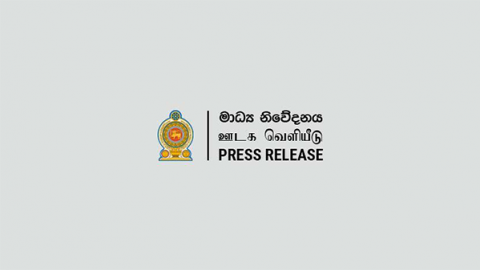
• President Meets with Pakistani Prime Minister and Former British Prime Minister
• World Leaders Praise Corruption-Free Governance
President Anura Kumara Disanayake who is currently attending the World Governments Summit 2025 in Dubai held several high-level bilateral discussions with Heads of State, today (11).
During the day, the President met with Pakistan’s Prime Minister Muhammad Shehbaz Sharif. Prime Minister Sharif extended his congratulations to President Disanayake on his government’s significant electoral victory in Sri Lanka.
The discussions focused on strengthening trade relations and diversifying markets between the two countries. Both leaders also deliberated on the importance of adopting a new strategic framework to enhance economic co-operation.
President Disanayake briefed the Pakistani Prime Minister on Sri Lanka’s current economic policies, emphasizing that his administration is committed to transparent and corruption-free economic management. He further highlighted that such governance would create a solid foundation for Sri Lanka’s economic growth.
Additionally, the discussion placed special emphasis on promoting tourism between Sri Lanka and Pakistan, exploring opportunities to boost the industry in both countries.
Meanwhile, President Disanayake also met with former British Prime Minister Tony Blair. The discussions revolved around the potential for Sri Lanka to leverage the United Kingdom’s expertise and specialized knowledge in various sectors.
President Disanayake briefed Blair on the investment opportunities in Sri Lanka’s health, ports and tourism sectors, extending an invitation for UK investors to explore these prospects.
Former British Prime Minister Blair highlighted the potential for Sri Lanka to benefit from expertise in climate change adaptation, good governance and agricultural advancements.
Additionally, he commended Sri Lanka’s current administration for its transparency and corruption-free governance, specifically recognizing these qualities as key strengths of the present leadership.
Foreign Affairs, Foreign Employment and Tourism Minister Vijitha Herath also accompanied the President on this visit.
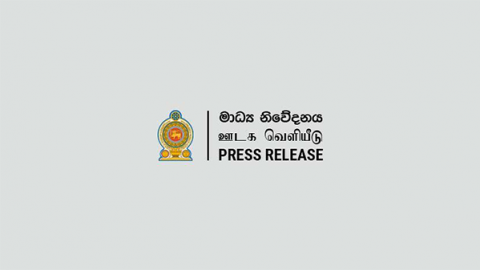
• World Governments Summit 2025 Commences
Today (11) marks the second day of President Anura Kumara Disanayake’s three-day official visit to the United Arab Emirates (UAE).
The President is scheduled to participate in the plenary session of the World Governments Summit 2025 in Dubai, held under the theme ‘Shaping Future Governments.’ Throughout the day, he is also set to engage in several strategically significant bilateral discussions.
Accordingly, arrangements have been made for bilateral talks with the CEO of Dow Jones, followed by a meeting with Colombian President Gustavo Petro.
Additionally, President Disanayake will hold discussions with former British Prime Minister Tony Blair and later in the afternoon, he is scheduled to engage in a bilateral meeting with Pakistani Prime Minister Muhammad Shehbaz Sharif to discuss key issues of mutual interest.
Following this, the President will also meet the Chief Executive Officer (CEO) of Oracle.
In the evening, President Disanayake will hold bilateral talks with Prime Minister of State of Kuwait His Highness Sheikh Ahmed Abdullah Al Ahmad Al Sabah.
Concluding the day’s engagements, the President will attend a community event at the Pullman City Centre.
Minister of Foreign Affairs, Foreign Employment and Tourism Vijitha Herath is also accompanying President Anura Kumara Disanayake on this visit.
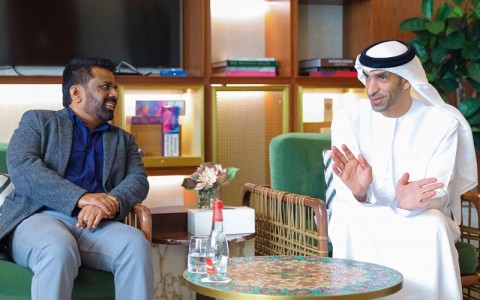
President Anura Kumara Disanayake, along with his delegation, arrived at Dubai International Airport this afternoon (10) to participate in the World Governments Summit (WGS) 2025, which is scheduled to take place from February 11 to 13 in Dubai, United Arab Emirates. Upon arrival, the delegation, including the President, was warmly welcomed by Dr. Thani bin Ahmed Al Zeyoudi, UAE Minister of State for Foreign Trade, and other state officials.
Also present at the reception were Embassy of Sri Lanka to the United Arab Emirates Chargé d’ affaires Thakshila Arnolda and Consul General of Sri Lanka to Dubai and the Northern Emirates Alexi Gunasekera, along with representatives from the Sri Lanka Embassy in Dubai.
This afternoon, President Disanayake is scheduled to meet with Sheikh Abdullah bin Mohammed Al Qasimi, the Chairman of the Master Investment Group and the ruler’s representative for Ras Al Khaimah. During this meeting, discussions will focus on strengthening economic and investment cooperation between Sri Lanka and the UAE.
Following the said discussion, the President is expected to attend the ‘TIME 100 Gala Dinner’ at the renowned Museum of the Future in Dubai.
The Minister of Foreign Affairs, Foreign Employment, and Tourism Vijitha Herath, is also accompanying the President on this visit.
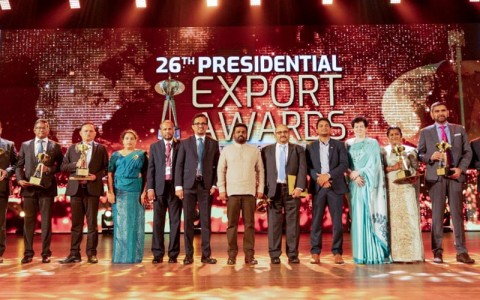
President Anura Kumar Disanayake invited Sri Lankan exporters to rebuild and thrive on a robust economic foundation.
The President emphasized that our country faces the challenge of capturing market share from a position of relative weakness. He pointed out that, to overcome this, external support had to be sought. In this regard, he highlighted that the government is prepared to provide assistance for recovery based on the current economic stability.
President Anura Kumar Disanayake made these remarks at the 26th Presidential Export Awards Ceremony.
The 26th Presidential Export Awards, organized by the Sri Lanka Export Development Board (EDB), was held today (07) at the Bandaranaike Memorial International Conference Hall (BMICH) under the patronage of President Anura Kumar Disanayake.
The main objective of the awards ceremony is to recognize exporters who have made significant contributions to the economic development of Sri Lanka.
The Presidential Export Award, presented by the President, is the highest honour for Sri Lankan exporters who have made significant contributions to the export sector and economic development.
The Presidential Export Awards program, initiated by the EDB in 1981, has been held annually to recognize Sri Lanka’s top exporters. The awards ceremony for the 2023/24 financial year took place this year.
A total of 14 major awards and 51 awards in the categories of production and services were presented, with recipients gaining the opportunity to use the Presidential Export Award logo as a marketing tool for three years.
President Anura Kumar Disanayake further emphasized the critical importance of the trust placed in Sri Lanka by international economic stakeholders to stabilize the country’s economy. He noted that the global market economy is interconnected, not entirely independent.
He further pointed out that the primary challenge facing Sri Lanka is securing a substantial share of the market amidst the current global division of markets and the ongoing competition to reclaim market shares.
President Anura Kumar Disanayake noted that the global market has become an interconnected network. He emphasized that in order for the country to become a key participant in this market, it must engage in trade agreements that are beneficial to Sri Lanka. He cautioned that aggressive, reckless approaches to market penetration would not be successful, stressing the need for strategic, thoughtful engagement.
The President further stated that the government is already taking steps to provide the necessary technical support for Sri Lankan exporters to enter the market with high-quality products. He highlighted the government’s focus on supplying new goods and services in response to global changes, in line with international market trends.
Regarding the reduction of electricity bills, the President mentioned that the government is prioritizing renewable energy sources to maintain long-term stability in energy costs. He added that efforts are underway to lower costs and ensure stable pricing over the next few years.
President Disanayake also emphasized that the government is committed to playing a pivotal role in advancing the nation’s economy to new heights. He noted that even small or misguided decisions can have significant negative impacts on the economy, and therefore, decisions regarding the economy must be made with great caution and foresight.
In his remarks, the President assured that the government is fully committed to fulfilling exporters’ requests, which are vital to strengthening the nation’s economy and maintaining a strong economic foundation.
Finally, the President invited Sri Lankan exporters to unite in strengthening the economy, stressing the importance of collaboration and mutual understanding to navigate the challenges of economic recovery and growth effectively.
The ceremony was attended by several distinguished individuals, including Minister of Industry and Entrepreneurship Development Sunil Handunnetti, Minister of Labour and Deputy Minister of Economic Development Anil Jayantha Fernando, Minister of Energy Kumara Jayakody, Deputy Minister of Industry and Entrepreneurship Development Chathuranga Abeysinghe, Secretary to the Ministry of Industry and Entrepreneurship Development Thilaka Jayasundara, Chairman and Chief Executive of the Export Development Board of Sri Lanka Mangala Wijesinghe, Chairman of the Ceylon Chamber of Commerce Duminda Hulangamuwa, along with various Ministers, Deputy Ministers, Parliamentarians, foreign diplomats, Secretaries to the Ministries, and members of the EDB.
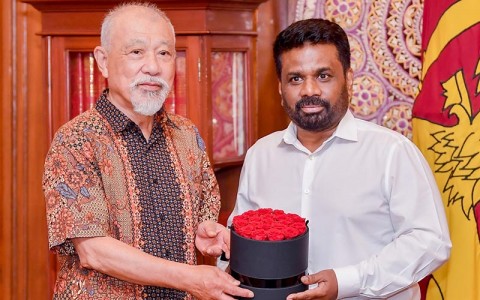
A meeting between President Anura Kumara Disanayake and the Chairman of the Nippon Foundation in Japan Mr. Yōhei Sasakawa was held today (07) at the Presidential Secretariat.
The President emphasized that the most prominent task of the government is to eradicate rural poverty in Sri Lanka, and he expressed hope that this initiative would also lead to improvements in education concurrently.
During the meeting, Mr. Yōhei Sasakawa, Chairman of the Nippon Foundation, stated that his foundation is committed to contributing to the improvement of public health, education, and the welfare of the differently abled community in Sri Lanka.
Mr. Sasakawa specifically highlighted that his organization is particularly focused on supporting the educational development of students in the Jaffna.
Furthermore, the President noted that the government plans to initiate special projects aimed at addressing rural poverty, which is a priority in the country’s development agenda.
The meeting also underscored the importance of further strengthening the friendship between the two nations.
Minister of Labour and Deputy Minister of Economic Development, Anil Jayantha Fernando, Secretary to the President, Dr. Nandika Sanath Kumanayake, Senior Additional Secretary to the President, Roshan Gamage, Japanese Ambassador to Sri Lanka, Akio Isomata, Chairman of the Sasakawa Health Foundation, Dr. Takahiro Nanri, Executive Director of The Nippon Foundation, Ichiro Kabasawa, and a group of representatives attended the meeting.
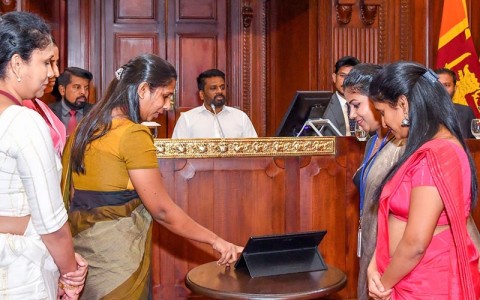
– President
Aimed at accelerating Sri Lanka’s digital transformation, three key digital initiatives were officially launched today (07) at the Presidential Secretariat under the patronage of President Anura Kumara Disanayake.
These initiatives include the establishment of the GovPay government digital payment platform, the expansion of the President’s Fund services to the Divisional Secretariat level, and the introduction of the eBMD system for obtaining birth, marriage, and death certificates through embassies.
The project is being jointly implemented by the Ministry of Digital Economy, the Information and Communication Technology Agency (ICTA), and LankaPay, with the Central Bank of Sri Lanka ensuring the security of the payment platform and fostering public trust in its operations.
Through the GovPay platform, payments for all services related to 16 government institutions can be processed in the initial phase. Starting from April, an additional 30 government institutions are planned to be integrated into the platform. Moving forward, there is an ambition to unify all government institutions under this system. Currently, 12 state and private banks have already joined the platform.
Speaking at the event, President Anura Kumara Disanayake emphasized that technological advancements play a pivotal role in improving people’s lives by delivering efficient, high-quality, and cost-effective services. He noted that throughout history, technological progress has been a driving force behind societal advancement, continuously elevating human civilization.
The President also highlighted that the President’s Fund has traditionally been managed from Colombo, which has posed significant challenges for citizens in remote villages. To address this, the fund’s operations will now be decentralized to the Divisional Secretariat level, ensuring greater accessibility and convenience.
He further stressed that such transformative decisions should have been made long ago, as delays in policy implementation have hampered economic progress and public welfare. However, with digitalization, urban and rural communities are now more interconnected than ever, making technology a vital tool in addressing rural poverty and resolving grassroots challenges.
President Disanayake reaffirmed that digitalization is the key driver that can propel Sri Lanka to a new stage of development, enabling citizens to meet their needs seamlessly, free from obstacles, inefficiencies, and bureaucratic delays.
President Anura Kumara Disanayake emphasized that due to the mechanized nature of modern life, the Sri Lankan people have gradually lost their connection to cultural living.
However, he pointed out that digitalization could facilitate the revival of cultural life, making it essential to ensure the success of this initiative. He further stated that the introduction of the Digital National Identity Card (Digital ID) marks a key milestone in this transformation.
The President stressed the urgency of implementing these changes rapidly, highlighting that transparency, efficiency, and bridging the urban-rural divide are critical to Sri Lanka’s digital transformation. He assured that the government is making significant efforts to elevate the nation to a new level through digitalization.
Senior Advisor to the President on Digitalization and Chairman of the Information and Communication Technology Agency (ICTA) Dr. Hans Wijayasuriya, stated that Sri Lanka already possesses 75% of the necessary skills to build a strong digital economy. However, to fully unlock this potential, the remaining gaps must be addressed, with a goal of completing this process within the next three years.
As part of this initiative, the President’s Fund was officially decentralized to the Divisional Secretariat level, enabling online application submissions for financial assistance.
To further drive digital transformation, a system was introduced allowing Sri Lankans living abroad to obtain certified copies of birth, marriage, and death certificates through their respective embassies. As an initial implementation, a Sri Lankan resident in South Korea successfully received a birth certificate through the online system.
This initiative marks a significant step forward, as enabling expatriate Sri Lankans to access official documents via their embassies will greatly simplify bureaucratic processes and improve their quality of life.
The event was attended by Minister of Public Administration, Provincial Councils, and Local Government Chandana Abeyratne, Deputy Minister of Digital Economy Eranga Weeraratne, Secretary to the President Dr. Nandika Sanath Kumanayake, Governor of the Central Bank Dr. Nandalal Weerasinghe, Secretary of the President’s Fund and Senior Additional Secretary to the President Roshan Gamage, along with several other dignitaries.
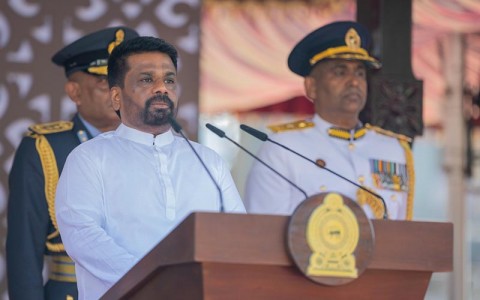
This year, we commemorate a special Independence Day. Rather than merely reflecting on our past, this year we celebrate Independence Day looking forward to the future. Today, we celebrate Independence Day, at a juncture when people from the northern, southern, eastern, and central regions of our country collectively dream of a future defined by a prosperous Sri Lankan State, a modern Sri Lankan nation.
On February 4, 1948, our country attained the political autonomy requisite for self-determination. Although that freedom was constrained, it nonetheless held profound significance. That moment marked the inaugural instance in our history when we secured political independence. This island, which had been partially subjected to Western imperialist rule since 1505, was entirely subsumed as a British colony in 1815. It is on a day such as today that the political prerequisites for emerging as an independent state, liberated 77 years ago, begin to be fulfilled. Therefore, it is a day worthy of celebration.
Today is a day to honor all the valiant heroes who rendered immense sacrifices to render this day possible. Moreover, even after 1948, as we carried forward the mantle bestowed upon us to realize complete freedom, additional courageous souls have traversed arduous paths in pursuit of our liberation. We have journeyed far to reach this moment of celebrating our 77th anniversary of independence, having borne that baton through the passage of time, including the pivotal year 1972, when we attained full political sovereignty under a constitutional crown. In that journey, we have arrived at this day, forged by the blood and sweat of thousands of gallant people, both celebrated heroes and heroines as well as the unsung ones, who sacrificed their lives for our freedom. We hereby pay our homage to all of them in this moment.
Today, as the democratically elected President of this state, I stand before our proud national flag in Independence Square, not only as your leader but as a brother who has borne the historical burden emblematic of our future freedom. I am confident that you stand with me in this moment, sharing in the weight of this burden.
Together, we must embark upon a journey towards economic liberation and socio-cultural emancipation, in short, towards the freedom essential for us to live with pride as contemporary citizens of this nation. Not only must we overcome the ethnic, religious, and caste divisions that have long fragmented and subjugated us as subjects, but we must also eradicate the entrenched prejudices that exist between political representatives and the populace, between institutional leaders and their staff, between passengers and public transportation operators, between government employees and the citizens they serve, between educators and students, and so forth. We must purify our society by eradicating these prejudices and reaffirm that human dignity, love, and compassion, the hallmarks of the modern era, form the bedrock of all human relationships. Similarly, as citizens of this nation, we must not permit the respect or affection inherently owed to every human being to be curtailed by disability, age, illness, or any other such limitation.
Only when we have fully commemorated 77 years of liberation from colonialism can we reimagine freedom for our nation.
Therefore, we must recognize that in our quest to attain comprehensive economic, social, and cultural freedom, each of us is a warrior on the same battlefield. Collectively, we must persist in our struggle for freedom on behalf of this motherland.
In this endeavor, you, as farmers and fishermen who sustain our nation with food, as educators who cultivate knowledge and nurture future generations, as healthcare professionals who safeguard the well-being of our people, and as members of the police and security forces who ensure the safety of our citizens, bear an indispensable responsibility. Equally, those who fortify our manufacturing sector, propel our nation toward industrialization, and bolster our service economy, from garment factory workers to the women who harvest tea leaves in the highlands, from expatriates laboring abroad to those striving to elevate our nation through information technology, and from advocates of the tourism industry, each of you plays a crucial role in nurturing our motherland.
To secure our economic freedom, rather than succumbing to weakness in the global economic system and being overwhelmed by its every fluctuation, we must unite in our efforts for this motherland. In our pursuit of economic liberation, we must remain steadfast, never relegating our social and cultural freedom to a subordinate position.
Consequently, as artists, writers, journalists, and scholars, you bear an indispensable responsibility to purify and rejuvenate our national spirit, which has been tarnished by hatred and anger. In this context, religious leaders have likewise been entrusted with a profound responsibility.
Similarly, as devoted mothers and fathers nurturing the future generations of this nation, you, too, have a vital role to fulfill.
Likewise, as the sons and daughters diligently studying today in preparation to steward this nation tomorrow, you possess a unique and crucial role.
Just as the mantle of responsibility to lead this nation into the future was entrusted to us through the sacrifices, blood, tears, and sweat of those who loved our country immeasurably, so too shall we one day bestow that honorable responsibility upon you. However, on February 4, 2025, as we commemorate our national independence, 77 years since our liberation from colonial rule, I must pledge one promise to you. The nation we bequeath to you is not merely the country that history has conferred upon us, but your own homeland, a nation in which you can aspire to live as global citizens. It is a nation that reveres human dignity and embodies an elevated cultural ethos. Moreover, it is a country that guarantees your right to partake in the scientific, technological, and intellectual advancements that human civilization has realized thus far, as citizens of this Sri Lankan state.
I assert this unequivocally before you today, for we possess no legitimate excuse to squander this magnificent opportunity bestowed upon us by history. The future will attest that we have not faltered in this regard. I am equally confident that you will guide this cherished motherland into the future with even greater devotion and vigor than we have demonstrated.
As human beings, our inalienable duty, by virtue of our existence on this earth, is to render this world a haven of elevated humanity, and to ensure that all individuals have equitable opportunities to partake in and embody that higher humanity. Our struggle for freedom is intrinsically intertwined with this noble aspiration.
Therefore, let us envision that dream of freedom collectively, let us bring that dream to fruition together.
Perhaps you and I, indeed all of us, are united on this journey, and it is imperative to remember that this journey has the potential to render our motherland, this Sri Lankan state, an enduring exemplar of freedom and democracy in the contemporary political landscape. Although we may not emerge as the wealthiest nation globally, through our concerted efforts, we can evolve into a model state of equality and freedom, one that epitomizes the richest national spirit in the world.
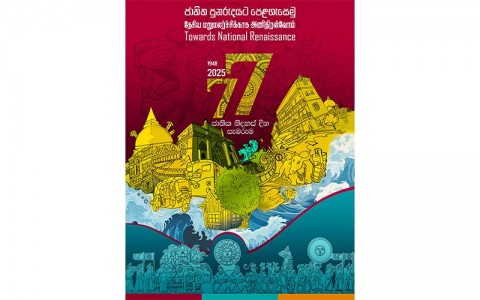
Today, as we celebrate the 77th National Independence Day, we do so with hopes and aspirations for a new kind of freedom. Reflecting on Sri Lanka’s history, we have now embarked on a new path, with a government built through the collective efforts of the people from the North, East, West, and South. At this moment, we stand together to take on the challenge of rebuilding a thriving nation – a beautiful life; something that was lost and eluded us over the past century.
For the sake of our future generations, we must elevate our nation to new heights. This was the very expectation of all the heroes in our history who struggled to achieve it with their blood and tears. Therefore, both individually and collectively, we must build a modern, developed Sri Lankan nation, guided by social, environmental, and ethical principles.
As the new government, over the past four months, we have laid the foundation for a stable economy, introduced a new political culture, and committed ourselves to a new political ideal. We strive for a society where people regard each other with equality, respect, and empathy; —free from racism and religious divisions. We focus on governance through public engagement and the rule of law, while prioritising the eradication of rural poverty. Our policies and actions aim to ensure that no citizen, particularly the most vulnerable, is left behind. Steps have also been taken towards digitalising the economy to embrace advancements in science and technology that we previously missed. Additionally, we are committed to transforming Sri Lanka’s global image—from a country known for corrupt governance to one that upholds an independent foreign policy and earns trust in international relations.
Despite countless obstacles and the deep-rooted flaws of the past corrupt political system, the people’s government, built by the collective will of the citizens, is steadily progressing forward. As promised, we have successfully ushered Sri Lanka into an era of national revival. Now, the task ahead is to systematically build upon this foundation and realise a centuries-old dream with unwavering confidence and creativity.
On this 77th National Independence Day, I invite all Sri Lankans to stand strong and united, to take part in shaping a modern vision of freedom, and to contribute to the collective beginning of this new era of revival.
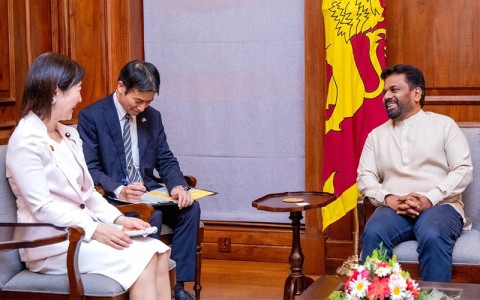
• Sri Lanka Attracts Global Investments Due to On-going Anti-Corruption Measures
– Japan’s Parliamentary Vice-Minister for Foreign Affairs, Ikuina Akiko, Commends Sri Lanka’s Reforms
The Government of Japan has extended a grant of 300 million Japanese Yen (approximately LKR 565 million) to Sri Lanka to enhance waste management infrastructure facilities under the ‘Clean Sri Lanka’ Program.
A Memorandum of Understanding (MoU) for the grant was signed yesterday (03) at the Presidential Secretariat in the presence of President Anura Kumara Disanayake. The agreement was signed by Ms.IKUINA Akiko, Parliamentary Vice-Minister of Foreign Affairs, Japan and Secretary to the Ministry of Finance, Mr. Mahinda Siriwardana.
This grant will be utilized to enhance the waste management capacity of local government authorities in the Western, Northern, and Eastern Provinces by funding to procure 28 garbage compactors, enhancing the country’s waste transport capacity. The allocation of vehicles will be as follows Western Province – 14 trucks, Eastern Province – 8 trucks and Northern Province – 6 trucks.
Vice-Minister for Foreign Affairs, Ms. IKUINA Akiko, stated that current government’s anti-corruption initiatives have attracted the country’s global appeal for investment. She made these remarks with President Disanayake while reaffirming Japan’s commitment to further support Sri Lanka’s development efforts.
The Government of Japan also expressed its willingness to continue assisting Sri Lanka in its anti-corruption measures and broader governance reforms. During the discussion Vice Minister SAYAMA delivered a message of goodwill from the Prime Minister of Japan to President Anura Kumara Disanayake.
In response, President Disanayake expressed his gratitude to the Japanese government for its on-going cooperation and highlighted the long-standing friendship between the two nations. He assured that Sri Lanka would continue to uphold its anti-corruption policies without compromise and emphasized the government’s commitment to transparency and good governance.
The President also thanked Japan for resuming previously halted Japan-funded projects in Sri Lanka and acknowledged Japan’s support in the country’s debt restructuring process.
President Disanayake also expressed his gratitude to the Japanese government for providing employment opportunities to a large number of Sri Lankan expatriates and requested the Japanese government to provide further assistance in developing those opportunities in the future. Additionally, he requested Japan’s assistance in implementing a project to improve Sri Lanka’s public transportation system through Japanese aid.
The event was graced by several high-ranking officials, including Dr. Anil Jayantha Fernando, Minister of Labour and Deputy Minister Economic Development, Dr. Nandika Sanath Kumanayake Secretary to the President, Roshan Gamage, Senior Additional Secretary to the President – along with H.E. Mr. ISOMATA Akio, Ambassador of Japan to Sri Lanka, Mr. SAITO Jun, Secretary to Hon. IKUINA, MOFA, Mr. MUROTANI Masakatsu, Director, Southwest Asia Division, MOFA, Ms. HIROSE Akiko, Director, Country Assistance Planning Division II, MOFA and Mr. IWASE Kiichiro, Deputy Director, Southwest Asia Division, MOFA.


